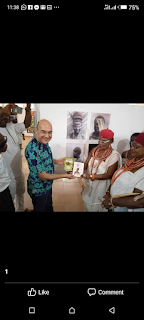Famous Ibusa Family: The Historical Wealth of the Chigbue
Famous Ibusa Family: The Historical Wealth of the Chigbue By Emeka Esogbue The story of the Chigbue family shows that from time immemorial, the Ibusa community is known to be rich in human resources. The Isieke family especially, to which this author ancestrally belongs, connected by the long, thin piece of land and divided by the narrow path called "Isieke High Street", is known for the great number of men and women famoused for achievements in their particular fields. On the other hand, as typical of most African societies, the people of Ibusa are rarely known to document biographies, autobiographies or provide documented family histories for the study of such families hence, the greater part of this story is derived from oral sources available to the author. The Chigbue family of Isieke in Umuekea Quarters of Ibusa enjoys fame within and outside the community. However, like the Ajufo family of Umuehea of the same community, the Chigbue family seems more to many a '
